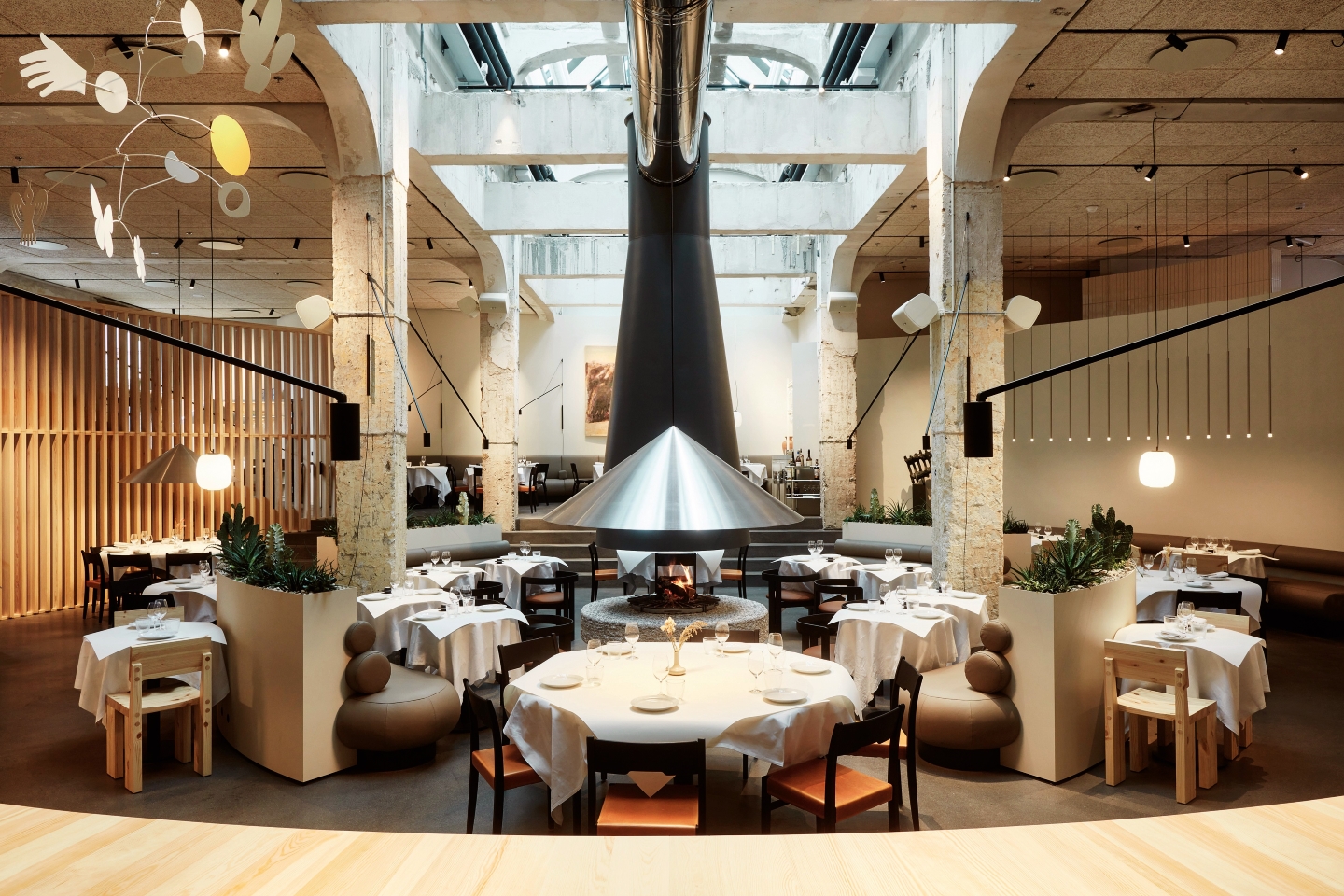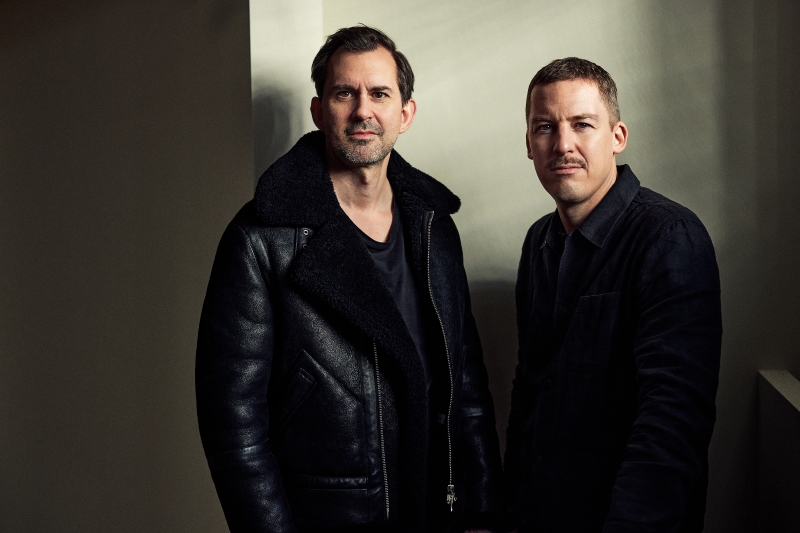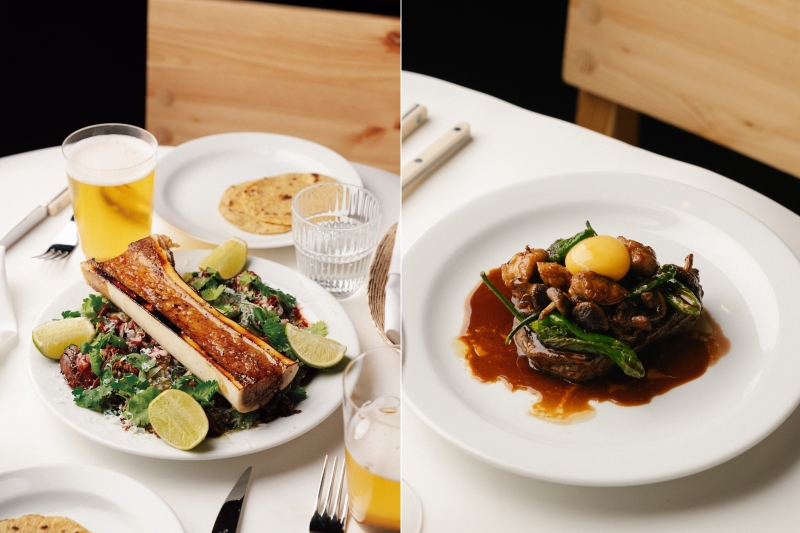
The three-storey establishment seats up to 150 (All photos: Solen)
Stockholm’s meatpacking district, Slakthusområdet, was where Michelin-starred restaurateur Albin Wessman came by to pick up produce when he was a young chef two decades ago. In recent years, the industrial area has been developed into a unique destination focusing on food, culture and entertainment.
Year-old Solen, helmed by Wessman and business partner Adam Dahlberg, is one of the first establishments to enter the refurbished locality. “This side of the country holds abundant gastronomic history for Sweden and Stockholm,” he says.
The idea for the restaurant was initiated during the pandemic after they came across a 100-year-old slaughterhouse. “We visited the site back in 2021, saw how big and beautiful it was, and thought we could do something here.
“Adam and I were inspired by the food scene in America, especially Los Angeles, San Francisco and Napa Valley. We have a few favourite spots in LA like Bavel and Bestia, and were influenced by their industrial concept.”
A significant restoration was necessary for the historical premises to befit its new purpose. While its original features such as white-tiled walls and massive windows were maintained — the ancient structure is protected by strict building codes so there were regulations to abide by — the interior had been entirely done up to match the restaurant concept and design aesthetics that the founders had in mind.
adam_dahlberg_and_albin_wessman.jpg

They worked with Specific Generic, a Swedish architect design firm, to work out the details, including choosing the furniture and lighting, “which are some of the most important elements of a restaurant. We were planning to keep the flooring because it carried a century’s worth of history. But after testing its condition, they had to tear it down and build new foundations. We tried to keep the old, raw concrete feeling of the slaughterhouse and balanced it with a hint of modernity.”
Solen is furnished with chairs, tables and bars constructed using pine, a durable building material synonymous with the Scandinavian country. Wessman and Dahlberg also collaborated with local and Finnish designers to add the finishing touches — such as a custom pendant light, a fireplace and commissioned artworks — to the three-storey establishment, which seats up to 150.
“The ambition was to create an extravagant restaurant,” Wessman says. Besides its large capacity, the partners also developed an extensive menu to present a plethora of choices from lunch to dinner.
“There are two big stadiums nearby called Avicii Arena and Tele2 Arena, which are actively hosting concerts and sports events. So, there are a lot of people in this area. There has to be different reasons for them to come here. You don’t have to eat a whole course and sit for three hours. You can do a quick bite or go to the bar for a drink before or after a show. So, the menu has to be big to suit a varying crowd.”
Being particularly captivated by the culinary landscape in Los Angeles, the partners have incorporated the melting pot concept into their range of offerings. “LA does not have its own food culture. It is a hot spot for different types of cuisines including Mexican, South American, Mediterranean and Middle Eastern. So, we adopt flavours from regions such as Spain, France, Italy, Mexico, South American and Middle Eastern into our menu,” says Wessman.
solen_1.jpg

What these countries have in common is their sunny climate. “That’s where the restaurant name comes from. ‘Solen’ means ‘the sun’ in Swedish.” The theme of “fire” is highlighted across its interior — the custom fire pit at the heart of the building warms up its surroundings during winter and the open roof welcomes the bright daylight — as well as the menu.
Many dishes are roasted, grilled or smoked over open flames. “Most of them are prepared on the 2½m fireplace at the kitchen centre — something we were unable to install at our other restaurants in central Stockholm because of strict regulations and limited space. So, we are very happy to have that here,” says Wessman.
There are options for small plates such as hummus, homemade pita, tostada and beef tartare, along with big ones like steak, seafood and fish. One of Solen’s specialities is its pizzas, available in three variants: Prosciutto cotto, Insalata and Pepperoni.
“We never served pizza in any of our restaurants before. Obviously, as a chef, I have my own ways of making it. But people have their own version of the perfect pizza. When you Google, there are thousands of recipes. Here in 2023, we were trying to incorporate the Italian staple into our menu. So, how did we want to do it? We did a lot of testing to find our style because we are certainly going to get judged by that.”
Looking at their concern about how customers would perceive a classic dish, it is safe to say quality is something Wessman and Dahlberg aim to serve with every bite.
Solen is not their only venture, though. After working as chefs throughout their 20s, the duo set up their first pop-up restaurant in 2014 called Adam/Albin. Two years later, the eatery was awarded one Michelin star. They then extended their culinary footing in Sweden’s capital with three more eating houses, each bearing Asian influences, called Misshumasshu, Nori Bar and Raamen.
What’s next? “We will be renovating one of our restaurants for expansion and are also planning to go on gastronomical trips to search for inspiration for future undertakings,” says Wessman.
This article first appeared on May 20, 2024 in The Edge Malaysia.


